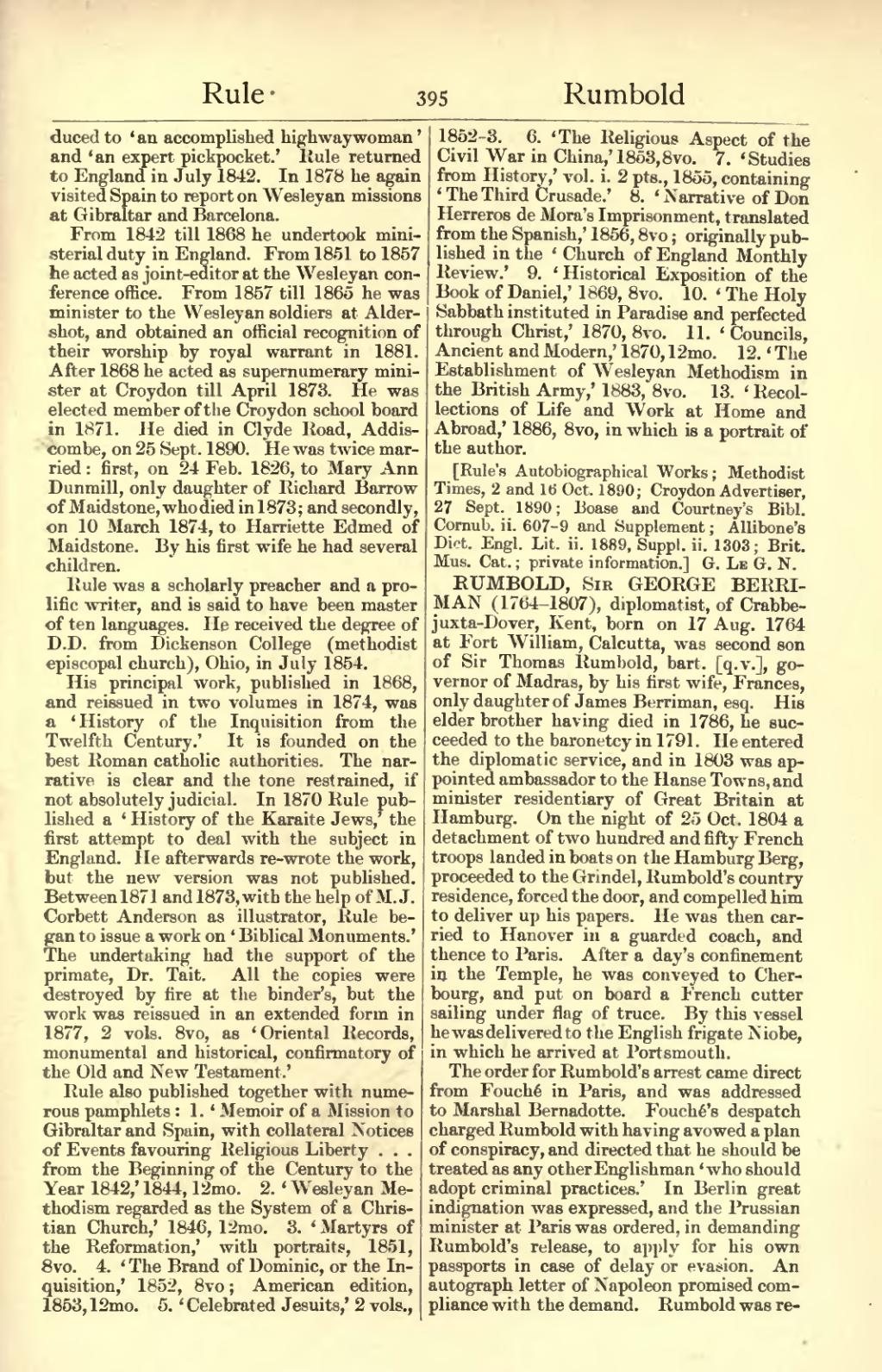duced to ‘an accomplished highwaywoman’ and ‘an expert pickpocket.’ Rule returned to England in July 1842. In 1878 he again visited Spain to report on Wesleyan missions at Gibraltar and Barcelona.
From 1842 till 1868 he undertook ministerial duty in England. From 1851 to 1857 he acted as joint-editor at the Wesleyan conference office. From 1857 till 1865 he was minister to the Wesleyan soldiers at Aldershot, and obtained an official recognition of their worship by royal warrant in 1881. After 1868 he acted as supernumerary minister at Croydon till April 1873. He was elected member of the Croydon school board in 1871. He died in Clyde Road, Addiscombe, on 25 Sept. 1890. He was twice married: first, on 24 Feb. 1826, to Mary Ann Dunmill, only daughter of Richard Barrow of Maidstone, who died in 1873; and secondly, on 10 March 1874, to Harriette Edmed of Maidstone. By his first wife he had several children.
Rule was a scholarly preacher and a prolific writer, and is said to have been master of ten languages. He received the degree of D.D. from Dickenson College (methodist episcopal church), Ohio, in July 1854.
His principal work, published in 1868, and reissued in two volumes in 1874, was a ‘History of the Inquisition from the Twelfth Century.’ It is founded on the best Roman catholic authorities. The narrative is clear and the tone restrained, if not absolutely judicial. In 1870 Rule published a ‘History of the Karaite Jews,’ the first attempt to deal with the subject in England. He afterwards re-wrote the work, but the new version was not published. Between 1871 and 1873, with the help of M. J. Corbett Anderson as illustrator, Rule began to issue a work on ‘Biblical Monuments.’ The undertaking had the support of the primate, Dr. Tait. All the copies were destroyed by fire at the binder's, but the work was reissued in an extended form in 1877, 2 vols. 8vo, as ‘Oriental Records, monumental and historical, confirmatory of the Old and New Testament.’
Rule also published together with numerous pamphlets: 1. ‘Memoir of a Mission to Gibraltar and Spain, with collateral Notices of Events favouring Religious Liberty … from the Beginning of the Century to the Year 1842,’ 1844, 12mo. 2. ‘Wesleyan Methodism regarded as the System of a Christian Church,’ 1846, 12mo. 3. ‘Martyrs of the Reformation,’ with portraits, 1851, 8vo. 4. ‘The Brand of Dominic, or the Inquisition,’ 1852, 8vo; American edition, 1853, 12mo. 5. ‘Celebrated Jesuits,’ 2 vols., 1852–3. 6. ‘The Religious Aspect of the Civil War in China,’ 1853, 8vo. 7. ‘Studies from History,’ vol. i. 2 pts., 1855, containing ‘The Third Crusade.’ 8. ‘Narrative of Don Herreros de Mora's Imprisonment, translated from the Spanish,’ 1856, 8vo; originally published in the ‘Church of England Monthly Review.’ 9. ‘Historical Exposition of the Book of Daniel,’ 1869, 8vo. 10. ‘The Holy Sabbath instituted in Paradise and perfected through Christ,’ 1870, 8vo. 11. ‘Councils, Ancient and Modern,’ 1870, 12mo. 12. ‘The Establishment of Wesleyan Methodism in the British Army,’ 1883, 8vo. 13. ‘Recollections of Life and Work at Home and Abroad,’ 1886, 8vo, in which is a portrait of the author.
[Rule's Autobiographical Works; Methodist Times, 2 and 16 Oct. 1890; Croydon Advertiser, 27 Sept. 1890; Boase and Courtney's Bibl. Cornub. ii. 607–9 and Suppl.]
RUMBOLD, Sir GEORGE BERRIMAN (1764–1807), diplomatist, of Crabbe-juxta-Dover, Kent, born 17 Aug. 1764 at Fort William, Calcutta, was second son of Sir Thomas Rumbold, bart. [q. v.], governor of Madras, by his first wife Frances, only daughter of James Berriman, esq. He was admitted a pensioner of Christ's College, Cambridge, 13 Jan. 1781, afterwards becoming a fellow-commoner. His elder brother having died in 1786, he succeeded to the baronetcy in 1791. He entered the diplomatic service, and in 1803 was appointed ambassador to the Hanse Towns, and minister residentiary of Great Britain at Hamburg. On the night of 25 Oct. 1804 a detachment of two hundred and fifty French troops landed in boats on the Hamburg Berg, proceeded to the Grindel, Rumbold's country residence, forced the door, and compelled him to deliver up his papers. He was then carried to Hanover in a guarded coach, and thence to Paris. After a day's confinement in the Temple, he was conveyed to Cherbourg, and put on board a French cutter sailing under flag of truce. By this vessel he was delivered to the English frigate Niobe, in which he arrived at Portsmouth.
The order for Rumbold's arrest came direct from Fouché in Paris, and was addressed to Marshal Bernadotte. Fouché's despatch charged Rumbold with having avowed a plan of conspiracy, and directed that he should be treated as any other Englishman ‘who should adopt criminal practices.’ In Berlin great indignation was expressed, and the Prussian minister at Paris was ordered, in demanding Rumbold's release, to apply for his own passports in case of delay or evasion. An autograph letter of Napoleon promised compliance with the demand. Rumbold was re-
